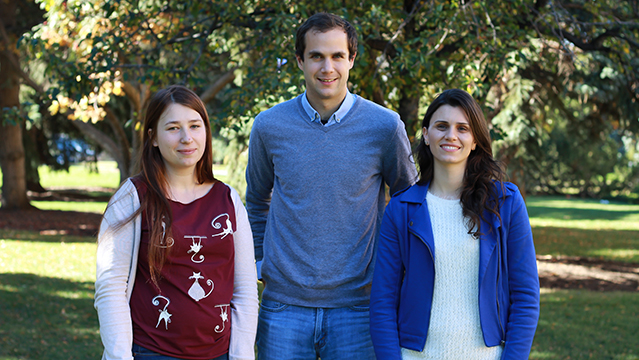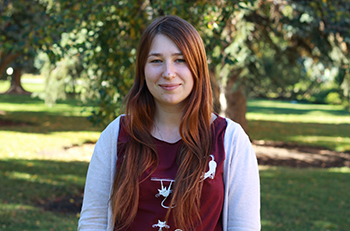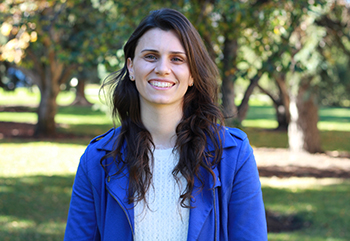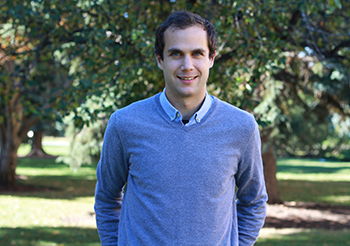
Nataliia Hula (left), Mike Trites, Stepheny Zani and Nathan Brandwein (not in photo) recently started their programs at the FoMD.
The University of Alberta is known for attracting curious minds from different corners of Canada and the world, coming to advance research projects with a global impact. This year, numerous up-and-comers joined the Faculty of Medicine & Dentistry's graduate programs with promising endeavours to develop on campus, and the Department of Physiology stands out with a diverse range of backgrounds and research interests.
Four physiology graduate students shared a bit about their plans and the projects that brought them to the U of A.
Nataliia Hula - PhD candidate
Originally from Ukraine, Hula started her PhD program last September supervised by Women and Children's Health Research Institute director Sandra Davidge. Her research focuses on cardiovascular complications in pregnancy.
Why did you choose this project?
It is hard to imagine our life without science. Every developed country expands all spheres of science and in this way, improve people's lives. Nowadays, many chronic and untreated diseases find their origin in pregnancy.
Pregnancy complications are a widespread problem in the world and are a significant health burden across many generations. This kind of research is relevant in any country and any population and can help many women with pregnancy complications give birth to healthy babies. Cardiovascular diseases are the main cause of death in the world, therefore the ability to improve development before birth has a major impact on population health.
Why the U of A?
The U of A has a good reputation among other Canadian universities and it offers a great variety of spheres in biology, where a young researcher can realize his or her potential in collaboration-not only with their own research group, but also with other departments.
What are your plans for the future?
I like science and find it an exciting and amazing part of my life. That is why I plan to continue my study and research in biology in future.
Nathan Brandwein - Master's degree candidate
Brandwein moved to Edmonton from his hometown in Toronto to complete an undergraduate program in the University of Alberta's Faculty of Science, where he majored in biological sciences and psychology.
The research for his master's program focuses on synaptic plasticity-changes that occur at the neuronal connections-in rodent brains.
What is your research about?
Specifically, I'm studying a process called 'synaptic tagging.' Synaptic tagging is critical to our understanding of memory formation because it helps to explain how newly generated proteins are captured by activated synapses in order to strengthen transmission.
Why the U of A?
When considering graduate schools in Canada, I looked no further than the U of A. There are endless opportunities in scientific research spanning a wide range of disciplines. During my undergrad, I completed a number of laboratory research courses, where I discovered my passion for research. My undergraduate research experience had an enormous influence on my decision to pursue a master's at the U of A.
What other interests do you have?
During my downtime I enjoy playing ultimate frisbee, golf and squash. I also try to find as much time as I can to give back to my community through volunteering both on- and off-campus.
What are your plans for the future?
Over the course of my master's, I hope to take part in a number of research conferences and seminars. There is nothing more exciting than showcasing your findings to other science enthusiasts, particularly those from outside your field of expertise.
I'm looking forward to what the future has in store, and am eager to embrace the challenges and successes that present themselves along the way.
Stepheny Zani - Master's degree candidate
Zani brought her expertise from Brazil to begin her master's program, and is studying the effect of angiotensin converting enzyme (ACE)-inhibitory peptides from hen egg whites on the glucose metabolism, the insulin signaling pathway and renin-angiotensin system.
Could you explain more about your research?
Those peptides are present in the egg and they have ACE- inhibitory properties. Being ACE-inhibitory peptides means that they act on the renin angiotensin system which is related to hypertension. Hypertension, diabetes, glucose metabolism, insulin signaling pathway are all involved with metabolic syndrome.
Why did you choose this research topic?
Throughout the years, while studying biomedical sciences and working in a clinical analysis laboratory I've seen so many people struggling to manage type 2 diabetes and its complications that I became interested in studying the disease and the methods to improve the quality of life of those affected by it.
Diabetes is considered a global epidemic and it's predicted to rise even more in the following years. There's a need for natural components that can effectively help manage type 2 diabetes without side effects and I believe that our study can help. I hope one day we can fill the gaps related to diabetes treatment and improve the quality of life of those affected by it or prevent the occurrence of it.
What brought you to the U of A?
The first thing that I thought when I decided to pursue a graduate degree was about what I really wanted to study and during my search I came across Catherine Chan's (professor in the Department of Physiology) publications and research line on the U of A website. After that I looked into the resources, laboratories and opportunities at the university and the physiology department. I was confident that the university could meet my expectations. I've been here for a short period but I am truly happy with my choice.
What are your plans for the future?
For now my plan is to apply for a PhD program within the Faculty of Medicine & Dentistry and continue studying the aspects related to type 2 diabetes and metabolic syndrome in a deeper way. I am also interested in developing my teaching skills and the U of A is providing me some resources.
Mike Trites - PhD candidate
Trites grew up in a small town in rural Nova Scotia. After finishing his undergrad program in biology and chemistry in 2013, he went on to complete a master's degree in biological sciences at the U of A. Last September, Trites began his PhD program with the Faculty of Medicine & Dentistry.
What is your research about?
I am working with Robin Clugston (assistant professor, Department of Physiology) investigating the physiologic mechanisms behind the liver's ability to acquire and store vitamin A in conditions of dietary excess, and then mobilize vitamin A to the rest of the body in times of need.
Why did you choose the U of A for your master's program?
Primarily because of its outstanding reputation, being consistently ranked as one of the premier research-intensive universities in the world. The U of A also has resources geared towards developing graduate students such as the graduate teaching and learning program and the professional development program.
The Department of Physiology has researchers from broad disciplines with extensive networks in multi-disciplinary research groups such as the Molecular and Cell Biology of Lipids Group (MCBL) and the Women and Children's Health Research Institute (WCHRI).
What other interests do you have?
My main interest outside of my research is running. I am fortunate to be sponsored by The Running Room and train with the Running Room Athletic Club. This past spring I was fifth overall and the first Canadian at the BMO Vancouver Marathon.
What are your plans for the future?
Right now my focus is primarily on getting off to a productive start in my program. Outside of specific research questions I want to answer, I am going to work through my program while developing skills that will allow me to pursue a trajectory to indulge my intellectual curiosity-like most grad students, I am not 100 per cent sure where I want to go after my program. Throughout my research career to date I have been able to experience positive aspects of various environments in academia, government research and private biotechnology.